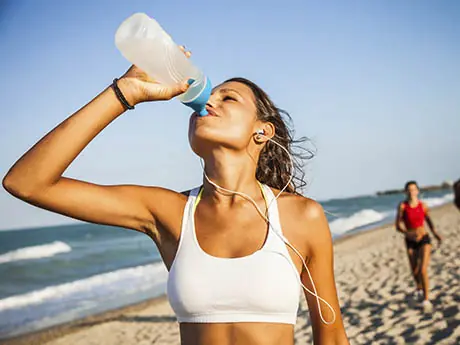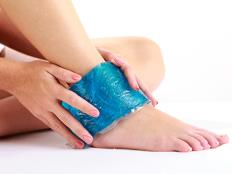
Summer weather brings a distinct set of challenges to the table for runners. While warmer temperatures offer a chance for runners to shed layers, soak up Vitamin D and use trails that are snow-covered during the winter months, they also pose the risk of dehydration. Hot and humid conditions don't have to be a runner's enemy; learn how to properly hydrate so you can make the most of your summer training.
Humidity and Sweat Rate
Heat and humidity are separate elements that work together to put your body into overdrive as you run. For runners who train in humid areas, high heart rates and excessive sweating can be daily struggles.
A warm temperature is far more dangerous in a humid climate than in a dry one. Humidity slows the evaporation process of sweat from the skin, making it difficult for the body to cool itself.
More: 9 Possible Reasons Why You're Sweating So Much
The most important thing about running in the heat and humidity is to adjust your pace, understanding that the added stress of humidity on the body requires you to slow down a bit. This way, you keep your perceived effort at the level it would be on a cool, dry day.
How Much Water?
There are many factors that influence sweat rate, including the surface area of the athlete's skin, genetics, diet and environment. On average, most runners shed somewhere between half a liter and two liters of sweat per hour of exercise. As a rule of thumb, you want to be consuming about 25 ounces of fluid per hour that you're running (use a water bottle that shows measurements on the side). This is particularly important for long runs when you are out in the hot summer sun for more than an 80 minutes.
Of course, drinking too much water at a time can lead to overhydration, diluting your electrolytes, so drinking a caloric, electrolyte sports drink in addition to water helps to balance out your body's needs as you run.
How important are electrolytes?
Electrolytes serve to keep your digestive, nervous, muscular and cardiac systems balanced and firing on all cylinders. When electrolyte levels in the body are imbalanced, they can cause cramping and fatigue. Severe imbalances can result in lightheadedness, nausea, joint aches and dry skin.
While you're running, you lose sodium and potassium (key electrolytes) through your sweat, which is why runners need to replenish with an electrolyte sports drink such as Powerade or Gatorade. You can also try an option with less sugar like Nuun electrolyte tablets.
More: What to Eat Before a Run
Are You Hydrated?
A good way to make sure you are hydrated enough is to check your urination habits. An average, a healthy adult urinates five to eight times each day. The color of your urine should be a light, pale yellow. Long runs and hard workouts are especially taxing on the body, so take special note that your urine does not get too dark on those days.
Another option to test your body's hydration that doesn't involve looking in the toilet is a skin pinch test. Pinch a small section of skin on the back of your hand and let go—it should snap back to flat quickly. If the pinched skin stays tented for a few seconds, you could be dehydrated.
More: Keep Your Cool: A Runner's Guide to Heat and Hydration
Connect with us on Twitter, Facebook, Instagram or Pinterest for more tips, recipes and ideas to fuel your ACTIVE life.
 Find your next race.
Find your next race.
About the Author

Get ACTIVE on the Go


Couch to 5K®
The best way to get new runners off the couch and across the finish line of their first 5K.
Available for iOS | Android






Discuss This Article